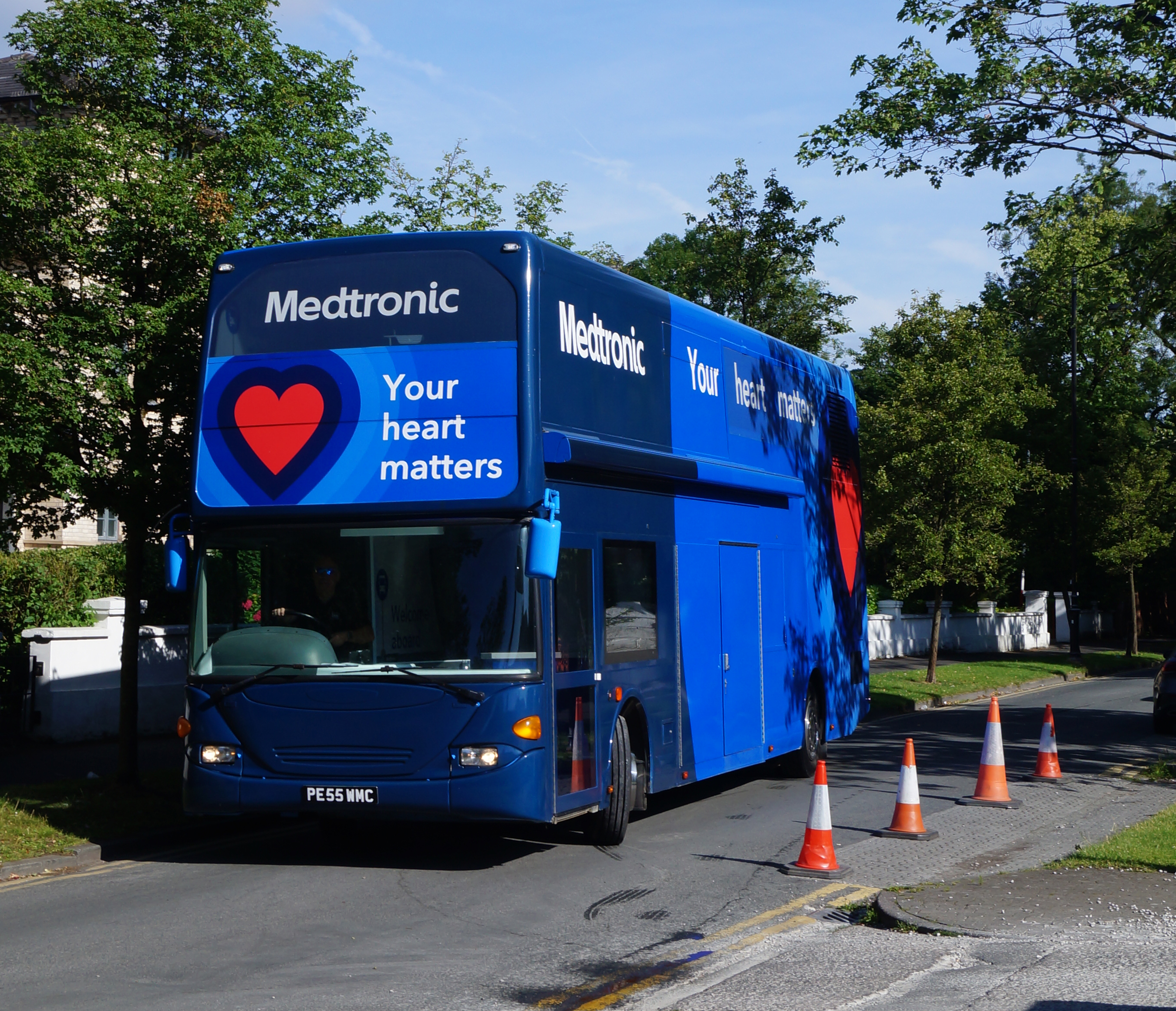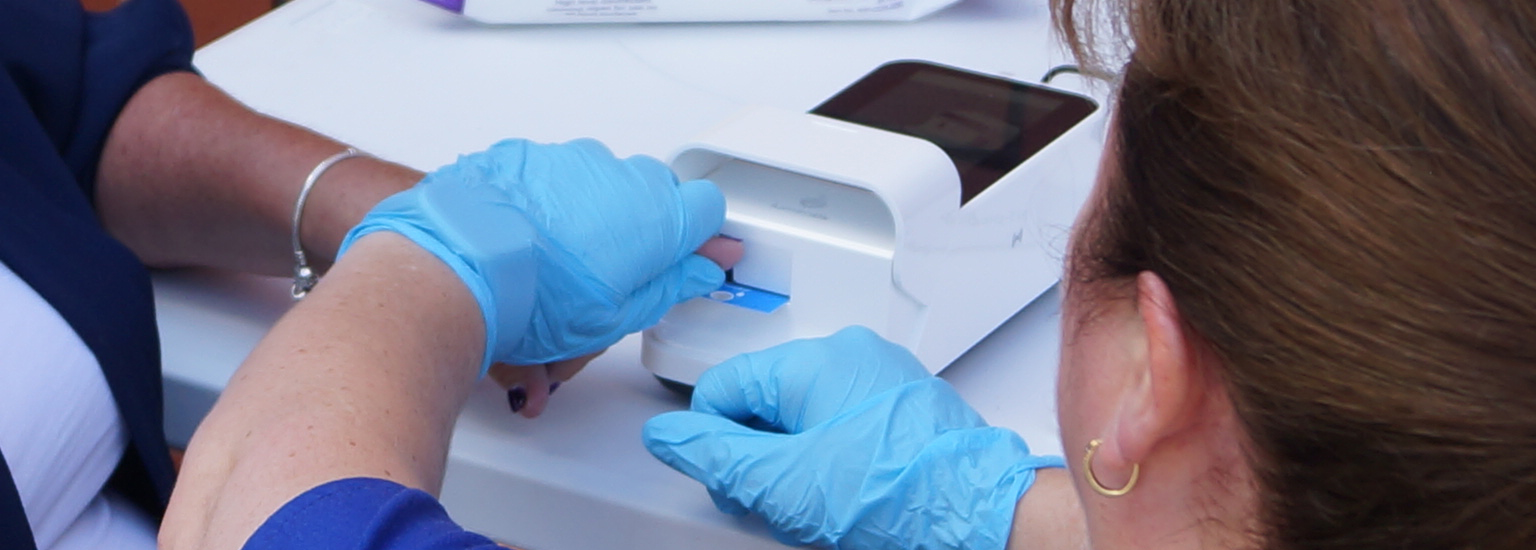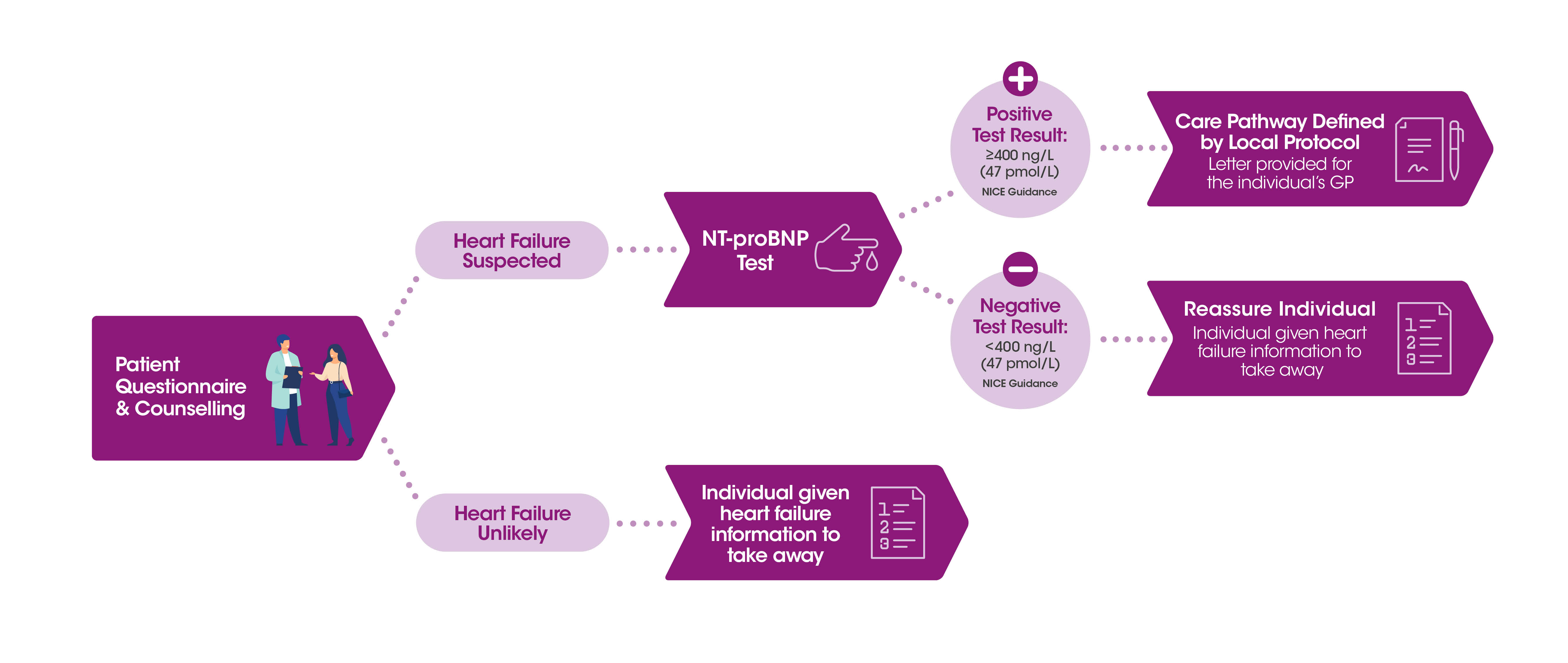Fast Lab Solutions
Case Study
Your Heart Matters Bus
A Mobile Approach to Improving Heart Health Within the Community


Introduction & Aims
Maintaining a heart-healthy lifestyle is linked to a longer life, free of chronic health conditions1. Community access to regular heart health checks could help to ensure this, or alternatively, alert healthcare professionals (HCP) that urgent intervention might be required for certain patients.
In collaboration with Medtronic, two patient-led heart failure charities, and multiple public and private healthcare providers across the UK, the Your Heart Matters Bus initiative offers free, confidential heart health checks to the general public – all on an eye-catching double decker bus.
NOTE: the Your Heart Matters initiative was held on a bus, but why not any other mobile clinic? Why not a community-based pharmacy, a university or a place of worship? The approach taken in this Case Study can be applied to nearly any setting where general accessibility is the primary focus.
The collective aims of the Your Heart Matters Bus initiative are as follows:
- To improve long-term patient outcomes within the community
- To reduce the economic burden on local healthcare institutions by providing treatment to patients faster, and by maximising efficiency in clinical pathways
- To raise public awareness and provide education around a range of potential heart conditions
- To provide access to reliable, easy-to-use NT-proBNP testing
- To give professional clinical advice to those who might require intervention
Today, the Your Heart Matters Bus initiative provides a true opportunity for industry collaborators, charitable organisations and healthcare institutions to transform community-based healthcare. Longer term, the view of this project is to embed screening programmes into NHS commissioned pathways to support the entire UK population.
Scope
This initiative is ongoing in the UK and can be applied to any market globally where there is an appetite to have a positive impact within the community by improving patient outcomes.
Access to a direct fingerstick NT-proBNP test enables this possibility. For the first time ever, laboratory quality results are just a fingerstick away – without requiring phlebotomy, sending samples to the lab, or sending the patient away to eventually return for a follow-up visit. Everything can be done in a single, efficient, informative session with the patient.
This Case Study aims to highlight both the clinical benefits for patients, and the economic benefits for healthcare institutions, of using a transformational approach to heart health checks within the community, empowered by the LumiraDx direct fingerstick NT-proBNP test.
Key benefits:
There is significant potential to have a positive impact on overall heart health within the community. Some of the key benefits to the Your Heart Matters Bus initiative are as follows:
Benefits to Patients
• Improved access to NT-proBNP testing and general heart health checks.
• Increased convenience – no need for (potentially multiple) follow-up visits.
• Know sooner if there is a need to make any lifestyle adjustments or potentially undergo treatment.
• Improved overall quality of life by catching HF sooner.
Benefits to Clinicians & Healthcare Institutions
• Improved patient experience.
• Improved operational efficiency – no need for (potentially multiple) followup visits – see more patients and reduce lead times for incoming patients.
• Improved clinical outcomes by catching HF sooner.
• No need for phlebotomy.
• No need to wait hours or days for laboratory results.
• Reduce the backlog on echocardiograms by either referring or not referring with confidence.
Background
Heart failure is not a single pathological diagnosis, but a clinical syndrome consisting of symptoms such as breathlessness and ankle swelling accompanied by signs of elevated jugular venous pressure and pulmonary crackles. In the UK, in 2023, there are estimated to be nearly 1 million people living with heart failure and 200,000 more diagnosed each year2. However, it is those who are living with unidentified heart failure that should not be forgotten - which is thought to be nearly 300,000 people3.
The delayed presentation of these people may mean they miss out on life-prolonging and symptom-improving treatments.
Understanding and management of heart failure has evolved considerably over the last couple of decades. In the past, we treated heart failure with medicines only, and were limited in what we could do for people with this condition. Now we can offer patients more advanced therapies and drugs that help them live longer with a better quality of life.
Cardiac resynchronization therapy (CRT) is treatment to help your heart beat with the right rhythm. It uses a pacemaker to restore the normal timing pattern of the heartbeat. The CRT pacemaker coordinates timing of the upper heart chambers (atria) and the lower heart chambers (ventricles). These devices have excellent success in improving health and survival4.
The Your Heart Matters Bus Initiative can enable and potentially drive improvements in understanding of heart conditions, and signpost members of the public for how to access information, provision of point of care testing and importantly reach those people who may not be able to easily talk to their doctor.
The Your Heart Matters Bus
The Your Heart Matters Bus event was held over 2 days in February 2023 in West Yorkshire, and over 1 day in July 2023 in Manchester. Future dates are currently in the planning phase and will be rolled out in the second half of 2023.

Methods
The free heart health checks were advertised across social media in the days preceding the walk-in clinic to increase awareness in the local areas. Members of the public were able to access the service in a centrally located community space, where HCPs and members of the heart health charities were on hand to provide information and clinical support.
People who attended the service were offered general advice on heart health. There was also an opportunity to have a heart rhythm check, and a stethoscope check (heart auscultation) which can detect heart valve disease.
A questionnaire, designed by Heart Valve Voice (www.heartvalvevoice.com) was used to ascertain which people would benefit from a fingerstick NT-proBNP test, by asking questions around the signs and symptoms usually associated with heart conditions like heart failure.
The voluntary responses to the questionnaire were reviewed by a HCP, with auscultation and pulse checks then performed. Based on this foundational clinical data and patient history, the HCP would then identify if an NT-proBNP test was recommended.
Negative Symptom Questionnaire:
Member of the public underwent auscultation and was provided with heart health awareness information.
Positive Symptom Questionnaire:
Member of the public then took the completed questionnaire to the LumiraDx NT-proBNP test station. The 12 minute, fingerstick blood test was completed by HCP and then information on heart failure and counselling was given.
The member of public was given a letter to take to their GP explaining the test that had been performed and the result.
The Role of the LumiraDx NT-proBNP test
The members of the public who were identified as positive for signs and symptoms of potential heart failure had an NT-proBNP test performed by a HCP using the LumiraDx direct fingerstick NT-proBNP test5. The clinical cut-off used for NT-proBNP was 400pg/mL (ng/L)* as outlined in the Westcliffe Cardiology Services: Managing of Heart Failure: detection and diagnosis (April 2021) and in the NICE Guideline when chronic heart failure is suspected6.

| NT-proBNP Result | Clinical Action |
|---|---|
| 400-2000 pg/mL | 6 week echo referral |
| ≥ 2001 pg/mL | 2 week urgent echo referral |
Table1. Cut-off for NT-proBNP adapted from Westcliffe Cardiology Services (April 2021)
*The LumiraDx Platform allows the user to select their preferred unit of measurement
Your Heart Matters Health Checks - Care Pathway

"The Your Heart Matters Bus is a great initiative to support the identification of possible heart problems in the community. With so many people suffering from unidentified heart failure in the community, and therefore not receiving appropriate management, the use of the LumiraDx NT-proBNP fingerstick point of care test would seem to be a vital tool for any similar project."
Dr Matt Fay, GPwSI
Westcliffe Health Innovations
Cardiology Service
Testimonial
A Clinical Perspective
Toni Weldon–
Lead Heart Failure Nurse for NHS Northern Care Alliance
Toni manages a team of 12 heart failure specialist nurses across 5 services and works with her colleagues as a Clinical Associate for the Greater Manchester Strategic Cardiac Network on the Heart Failure sub-group. Toni has been a Heart Failure Specialist Nurse for 19 years.
“ The Your Heart Matters Bus event brings heart health checks to areas of hard-to-reach people that may not always have the opportunity to access NHS services.
No appointment was required. For those members of the public who chose to engage on the day, a highly specialised team of clinicians from across the Greater Manchester area reviewed a completed questionnaire and signposted the individual towards a range of quick, on-site tests. These included blood pressure, electrocardiogram, auscultation (stethoscope check) and a simple direct fingerstick blood test to identify NT-proBNP levels. NT-proBNP is a useful indicator of heart failure and the LumiraDx Test only takes 12 minutes to process a result. The people then had the opportunity to discuss their heart health results with a HCP who issued a letter where required, detailing test results to be taken to the GP for further action.
To bring point of care testing into the community and enable on the day reassurance, support, education, and direction is a novel approach. A total of 181 people were reviewed on the day, with 56 NTproBNP tests performed. It was fun, professional, and supportive and I feel that ‘we made a difference’ to those people who engaged and were reassured.”
Results
| West Yorkshire Day 1 | West Yorkshire Day 2 | Manchester Day 1 | |
| Total number of visitors | 85 | 181 | 181 |
| Positive symptom questionnaire | 37 | 60 | 56 |
| NT-proBNP result ≥400pg/mL (ng/L) | 4 | 2 | 2 |
Table 2: Summary of results by site
All 8 people with a NT-proBNP result ≥400pg/mL (ng/L) were signposted to further investigation, and the member of the public with NT-proBNP >2001pg/mL (ng/L) was fast tracked to the Heart Failure clinic.
Without having their heart health checked on the Your Heart Matters Bus, these 8 patients may not have known for weeks, months, or perhaps even years that there was a potential issue with their underlying heart health. During that time, without HCP intervention, any potential heart failure likely would have progressed, potentially leading to significant negative outcomes for these patients.
Conclusions
Heart failure is a common condition which can be very serious if not acted upon quickly. If NT-proBNP testing and other heart checks are made more accessible to the general public, and if HCPs are given the opportunity to act on patients undiagnosed for heart failure before symptoms become too serious and potentially untreatable, patient outcomes can improve; as can economic outcomes for healthcare institutions.
As industry collaborators, charitable organisations and healthcare institutions who are all aiming to transform community-based healthcare, we believe that we have made a great start, however there is a lot of work still to be done.
The initiative was initially carried out in the UK but can be applied to any market globally where there is an appetite to have a positive impact within the community by improving patient outcomes. This initiative has already had a positive impact on improving patient outcomes – it is our sincere hope that it continues to spread globally as part of an overall effort to improve patient outcomes, one community at a time.
References:
1. American Heart Association Epidemiology, Prevention, Lifestyle & Cardiometabolic Health Scientific Sessions 2023 [accessed July 2023].
2. British Heart Foundation. Heart Failure – a Blueprint for Change. [accessed July 2023]
3. British Heart Foundation. Atrial Fibrillation: Finding the Missing 300,000. [accessed July 2023]
4. Cardiac Resynchronization Therapy (CRT) | American Heart Association [accessed August 2023].
5. LumiraDx NT-proBNP Test Webpage
6. NICE Guideline [NG106]. Chronic heart failure in adults: diagnosis and management. September 2018. [accessed July 2023].
BetterHealthExperiencesOutcomes
Supporting healthier lives, for individuals, communities and wider society.
Enabling responsive, personal relationships between patients and care teams.
Controlling and reducing costs to help ease pressure on healthcare budgets.